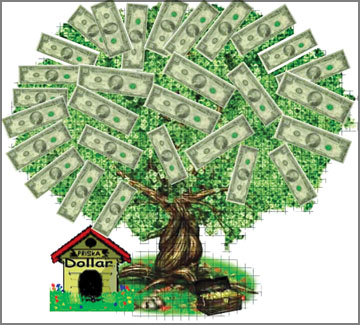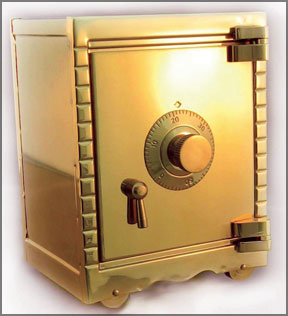How to choose a prudent investment
B. L. Ariyatillake
"Money that is no where must be somewhere." Some say it is
everywhere.
People generally keep money in cash form. In an inflationary economic
situation keeping money in cash form is the most unwisest thing to do.
Prices of goods and services are going up while your money remain the
same in monetary terms. In the end it can so happen that inflation has
eaten up most of your money in real value and terms.
People keep money in cash form for two good reasons -
1. Day to day spending;
2. As a precautionary measure in case one needs cash for some
unexpected shortly term need.
Apart from above there is no need for people to keep money in cash
form. People earn money by way of employment or otherwise. Some people
earn below their consumption level in which case they forcibly forego
consumption.
Some people may earn just up to consumption level with no room for
savings. Then there are some fortunate people who earn more than
consumption level with monies available for savings. There is another
category who will postpone consumption and do some savings for future
benefits or income. In the economy there are people who have money over
and above their consumption and precautionary needs and who can spare
their money for gain.
The extra money can be given to some entrepreneur at a price
popularly known as interest who will use the money gainfully. The person
who provides the money will get a price for his money which otherwise
would idle with him without any benefit. So at any given time the
economy will have a certain amount of money available for investment
purposes at various prices.

In other words an investment is the setting aside of a certain amount
of money in return for a future flow of income. This future flow may be
in the form of interest, income dividend, capital appreciation and like
wise.
It may be monthly, annually or at fixed or variable periods or as a
lump sum. In a laissez-faire economy there are many investment avenues
available to the public.
It may be mere lending by way of an agreement or otherwise in return
for future interest payment to the person who provides the funds.
Then there are savings accounts, fixed deposits, Shares, Treasury
Bills etc. It is for the provider of the finance to choose his
investment which he should do wisely.
At any point of time the economy will have a certain quantity of
money available for investment purposes. Different types of investment
will compete with each other to get the money for themselves while the
investing public will examine and scrutinize their merits or demerits
before they take a decision.
The primary concern of the investor will be the income from the
investment. It is not the gross income that matters but the net income.
Income from investments could be compared only by way of net income and
not by gross incomes.
Net income is not the sole criterion of a prudent investment. Of
course the primary desire of the investor will be the highest net income
he could obtain from investment. Apart from net income an investor
should be highly concerned with the security of the invested money. He
must be aware of the risks attached to that investment.
He must ensure that the other party would repay the money in all
circumstances. Security should not be compromised with returns on
investments.
Just as much the initial outlay, the income therefrom should also be
safe throughout the period of investment. As such the criteria that
applies to the initial security of the investment too applies to income
from it and also the regularity of such income.
Security wise the following order of ranking is generally accepted.
1. Government Securities;
2. State Banks;
3. Semi-State Banks;
4. Private Banks;
5. Private Financial
Institutions;
If one examines the rate of interest paid by the above financial
bodies on fixed deposits and other investments it is clear the
Institutions with a higher order of security pay lower rates than those
in the lower order of security. Institutions with government backing
rank high securitywise, for the reason that people believe that the
Government will never default the investors who have placed their trust
in them.
The rule is higher the security lower is the rate of return. Lower
the security higher is the rate of return expected by investors. All the
agencies mentioned above compete with each other to obtain the
investment money available in the economy. But institutions such as
private financial bodies will have to pay a higher rate of return to
stay alive in the competitive market. For example the National Savings
Bank can attract money at a lower rate of interest and still compete
with those with lower level security and who pay higher rates of
interest.
The second factor that influence the rate of return from investments
is the liquidity of the investment. By liquidity we mean how fast your
invested money could be converted into cash. As far as liquidity is
concerned savings accounts rank foremost in the market for the reason
that money invested in a savings account is available in cash over the
counter. Hence in this respect too the savings accounts can afford to
pay a lower rate of interest and yet attract money in the competitive
market.
Then comes the fixed deposits. Their liquidity is limited to the
period of the deposits, may be three months, one year, five years of any
fixed period. It is obvious that longer the period, liquidity is less.
Hence shorter term fixed deposits liquidwise will command lower rates.
The rule is higher, the liquidity, lower will be the rate of return.

Lower the liquidity, higher will be the rate of interest expected by
investors. The third criterion that will determine the rate of return
from an investment is management of the investment. Monies invested in
savings accounts, fixed deposits, shares and investments of a like
nature will have practically no management. But investments like
property, rentals etc. require high management. In a rental property the
income will be in the form of rent. It is a gross income. The investor
will have to bear costs of local authority taxation, do repairs and
maintenance give it on rent to a suitable tenant, avoid voids and keep
the premises continuously occupied all of which require management.
Collection of rent fall on the investor which all require management.
These are expenses their investor will have to bear in order to get a
net income from the investment. The fourth factor that influences rates
of return from investments is capital appreciation or depreciation. In
investments like savings accounts and fixed deposits one's initial
outlay in money terms remain the same throughout the period of
investment while one enjoys the interest payment regularly.
But investments in property or shares one's initial outlay namely the
purchase price of the property or shares can fluctuate.
One can realize his investment only by selling the property or share
in the open market.
The price at which he could sell his investment may not be equal to
the amount he has invested to purchase the investment. This price will
depend on the market prices at the time of sale.
It may be less or more than the amount at which he purchased the
investment. If the market has gone up he reaps such appreciations plus
the income he enjoyed over the period of investment. But if the market
has fallen during the period he has to bear the loss.
In a period of rising property values there is an increase in demand
for investment in properties. Such investments are hedges against
inflation. Inflation affects all investment alike.
But investment where there is a likelihood of expectation of
appreciation of capital value are described sometimes as hedges against
inflation for the reason that while inflation eats up your investment in
money terms capital appreciation of the investment offset such loss to a
certain extent or sometimes to more than inflationary rates. This is why
property investments are sought after in periods of rising land prices.
But in periods of declining land prices, investment in properties is not
desirable.
In choosing an investment one must take into account his personal
abilities and disabilities.
If he likes to enjoy a trouble free income investment in fixed
deposits, savings accounts etc. are the most desirable. But if you can
manage an investment, property investments would be more gainful.
Property investments are more risky, less liquid and management is
involved.
In periods of falling property prices investment in property should
be avoided. But in periods of rising land prices, investment in
properties is most desirable. Some people buy land blocks and keep for
future sale and recoup the invested money with substantial capital
gains. During the period of investment, the investor does not get any
income but capital appreciation compensate such foregoing of income.
The writer is a former Chief Valuer
|





